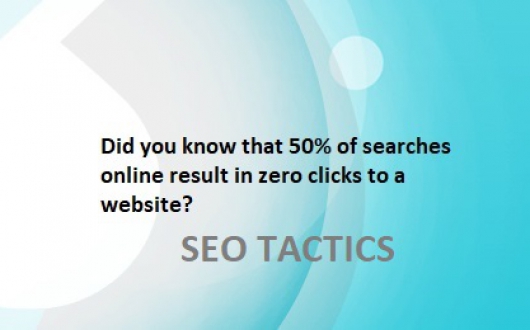A new milestone occurred in the first quarter of 2019. For the first time ever, zero-click searches have exceeded organic clicks since Google’s launch 20 years ago!
What are zero-click searches? They are search results that have users remaining on a Google-owned asset such as YouTube, Google Images and Google Maps rather than clicking through to a third-party website that results from an organic search result.
The zero-click data, reported by data intelligence platform Jumpshot, reveals that zero-click searches comprised just under 55% of all searches on Google in June 2019.
Not only are zero-click searches impacting SEO but so are Google Ads campaigns and how they are ranked. Recently, a tweet was posted online by Basecamp:

Why did this occur? According to CNBC’s recent article, “Google’s paid search ad are a ‘shakedown’,” Basecamp CEO says” it’s clear that Google’s digital search ad practices are being questioned. Not just by business, but also by the government.
People are feeling squeezed by a practice called “search conquesting” when brands seek to scoop up customers who are looking for another company. If you’ve discovered a competitor has run an Adword campaign against your company and now appears higher than your organic search results due to the Adword campaign – you know how frustrating this feels.
At Pivot Point Marketing, we’ve heard a lot lately from our customers that the ongoing changes in SEO, such as search conquesting and zero clicks to a website, are hurting their business by driving down their leads and traffic to their websites.
In response to our client concerns, we reached out to one of our SEO Experts, Michael Steele of Flywheel Digital, to provide insight into what we can reasonably do knowing the current issues facing organic search using Google.
What do “zero clicks” mean for you, your business and your digital marketing strategies?
According to Michael, this is a macrotrend in how people are interacting with Google.
“In 1998, you could search for something online and you’d just go to a website. That lasted until 2000, when AdWords started dramatically changing the mix of search traffic. First, it started with just a couple ad slots, but Google slowly ramped up the number of ads spots over time. At the same time, they began distributing more of their own digital properties like YouTube, introducing their own rich results, like Google Business and rich snippets, and incorporating voice search.”
“Fast forward to today and the result of those trends is this: 60% of searches end with Google reaping the only reward such as: an ad click, click to Google property, or zero-click result. Companies are left to fight for 40% of the pie,” states Michael.
So where do you start when tackling SEO challenges?
We agree with Michael that good quality content will always be a core part of your long term digital marketing strategy.
No matter what changes occur in search algorithms, if you have valuable content that is well written and researched it will always eventually be highly ranked.
Michael also suggests that the best way to win in SEO is to answer questions or address problems when writing content for your website. These formats always rank higher in search engines.
What are the tools that we can use for taking our bigger slice of the search ‘pie’?
According to Flywheel Digital, here are their top four suggestions for optimizing your current SEO strategy:
- Optimizing schema markups to sites – using schema mark up code that you place into your website to help search engines return more informative results. This code is an enhanced description which appears in search results.
- Local listings – create and optimize your Google My Business Account and use terms or locale that speak to your audience such as GTA for “Greater Toronto Area” or “Lower Mainland” referencing the downtown areas of Vancouver, BC. These listings are free, easy to update and can generate a big impact for your business.
- Advertising on your own – strategically placing ads on websites that are affiliated with your business or industry. Having an integrated marketing strategy that blends both organic search with paid advertising beyond Google Ads.
- Use accelerated mobile pages – also known as Google AMP you create web pages that load almost instantly on mobile phones for “instant gratification” AND these rich snippets are given preferential treatment by Google in search engine results.
If all of this seems daunting to you, don’t despair. SEO is an ongoing tactic to an overall marketing strategy and it needs to be constantly adjusted depending on changing trends. You can overcome search conquesting and zero clicks to websites by understanding what is currently available to your business and then starting with at least one of these suggestions to improve your SEO.
At Pivot Point Marketing, we want to stress that it is very important to set goals upfront for SEO prior to starting work to improve it. Be realistic in your expectations and ensure SEO is one of your digital marketing tactics to drive growth for your business.
Many thanks to Michael Steele, founder and digital-focused entrepreneur at Flywheel Digital for contributing to our blog post.
#SEO #SEOTactics #ZeroClicks #ContentMarketing #DigitalMarketing

